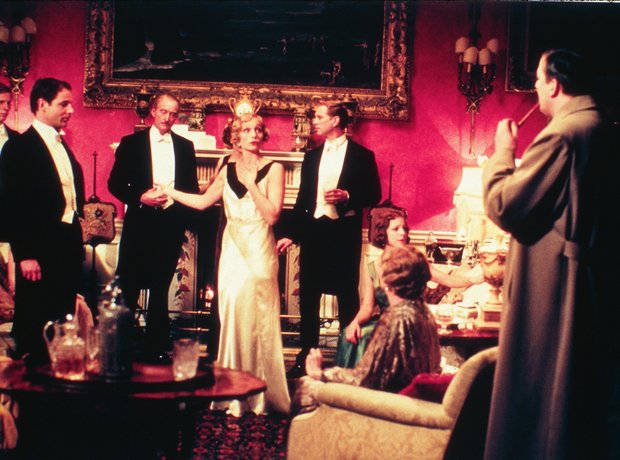
Gosford Park (2001) Directed by Robert Altman
It seems to me that Gosford Park is trying to be some combination of three things: an Agatha Christie-style mystery; a social critique of Britain's class structure; and a comedy of manners. I think it fails at all three things.
As a Agatha Christie-type mystery, it is simply not clever enough or intricate enough. There are no surprises until the end, but it's not like that there was a carefully constructed group of clues that lead to stunning revelation. In fact, if one is paying attention to the pants people are wearing, one of the culprits is an easy giveaway. The other one is not difficult to figure out as well. In other words, there is nothing mysterious about the mystery at any point in the entire movie.
As a satire on Britain's class structure, what does the movie provide that is fresh or insightful? Upperclass twits remain upperclass twits and the working class, who live literally beneath their betters on a separate floor, are conditioned to accept their lot as though it was God-given. Better movies have made similar points more insightfully.
As a comedy of manners, there simply isn't enough acerbic wit to make anything amusing. For starters, this is not an amusing lot. There are way too many characters, most of whom have little to do with the plot but all of whom require screen time. Outside of one Irish lass, who is more central than she deserves to be, there are really no rooting interests. For a comedy of manners to work, at least some of the characters need to be engaging, and just about none of them are here. They all seem stunted by the class system, which is maybe one of Altman's points, but it doesn't make for entertaining viewing.
Then there is the massive cast of actors that Altman employs, many among the cream of the crop of Britain's movie and theatre elite. Initially this is kind of fun as yet another familiar face pops up in a supporting role. But many of these actors have a lot of ham in them and so many actors in one movie means limited screen time which is at a real premium. Some actors handle this in stride: Clive Owen, Helen Mirren, Kristin Scott Thomas, and Jeremy Northam all acquit themselves well. Others, though, resort to shameless scene stealing. None is worse at this than Alan Bates but he has lots of company: Maggie Smith, Micheal Gambon, Derek Jacobi, and Steven Frye all chew up lots of scenery. And then there is the curious case of Ryan Philippe. What is he doing in this movie? He has an awful Scottish accent and he is also saddled with one of the least likeable characters in the movie. I don't think in the right vehicle that Philippe is a bad actor, but he seems severely out of his depth here.
In the end, Gosford Park felt like an oddball vanity project for Altman, one for which he didn't bother to bring his "A" game.
